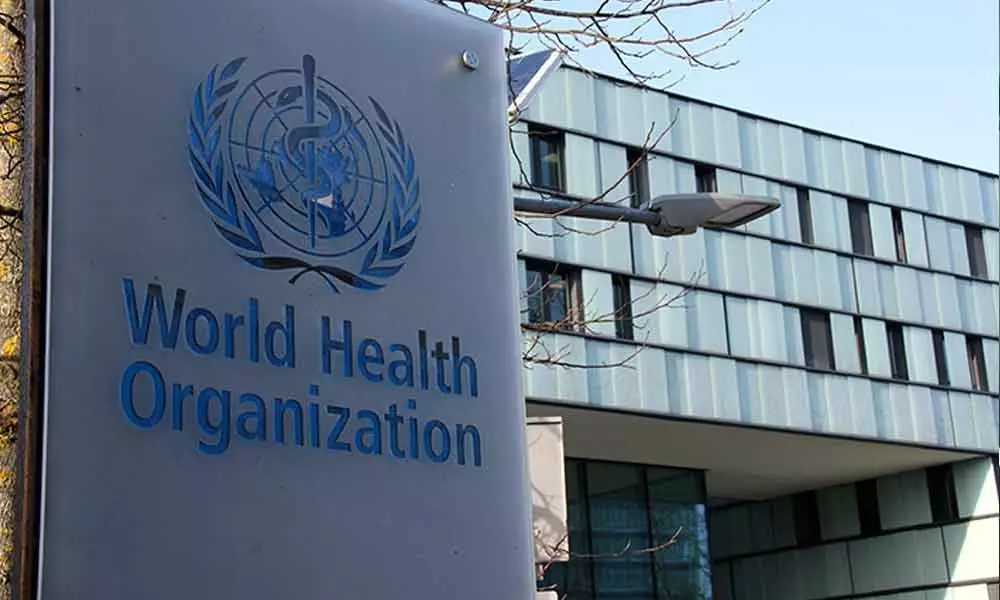Live
- India Faces Blow as Pacer Mohammed Shami Ruled Out for Remainder of Australia Series
- Biden Pardon: Joe Biden Commutes Death Sentences of 37 Inmates, Including Child Killers and Mass Murderers
- South Korea: Yoon believes impeachment trial takes priority over martial law probe
- Strict Action for Non-Adherence to Time Management - DMHO Dr. Swarajya Lakshmi
- Over 13.29 lakh houses approved for rural poor in Maharashtra: Shivraj Chouhan
- District Collector Urges Timely Completion of Indiramma Housing Scheme Survey
- Digital Arrest Scam: Hyderabad Man Duped of ₹7 Lakhs by Fake Crime Branch Police Callers
- Sukhbir Badal seeks President's Police medal for officer who saved his life
- US Firm Accordion Acquires Merilytics, Launches 1,500-Seater Office in Hyderabad
- Free Medical Camp Organized by Alampur Advocate Bar Association
Just In
WHO's SE Asia Region countries resolve to fight Coronavirus as 'ONE'


World Health Organization (Photo/IANS)
All the member countries of WHO South-East Asia Region on Thursday resolved to collectively fight Covid-19 and strengthen the region's response with better-equipped health systems to deliver essential health services during the pandemic.
New Delhi: All the member countries of WHO South-East Asia Region on Thursday resolved to collectively fight Covid-19 and strengthen the region's response with better-equipped health systems to deliver essential health services during the pandemic.
"The spread of Covid-19 has impacted almost every community, overwhelmed health systems and disrupted economies and livelihoods with effects reaching far beyond the health sector. It has also disproportionately impacted the most vulnerable. WHO recently surveyed countries to understand better the priorities in the South East Asia Region. At the top of the agenda is maintaining essential health services," said WHO Director-General Dr. Tedros Adhanom Ghebreyesus.
Signing the Declaration on 'Collective Response to Covid-19' along with Ministers of Health and representatives of member countries, WHO South-East Asia Regional Director, Dr Poonam Khetrapal Singh, said: "People's ordinary health needs do not disappear during such extraordinary events. Health security is not only about building capacity to prevent, prepare for and respond to acute events. It must also be about building capacity to maintain essential health services for the duration of response and into the recovery."
The Declaration was signed at the end of a ministerial round table on the second and final day of the Seventy-third Regional Committee Session, hosted by Thailand, and held virtually for the first time ever due to Covid-19 pandemic.
During the roundtable, all member countries shared their various Covid-19 response measures and efforts being made to maintain essential health services and restore those impacted due to the pandemic.
All countries agreed to the importance of universal health coverage and primary health care as a safety net for people, including the most vulnerable population, to access quality health services - both Covid-19 and other essential services.
The Declaration calls for efforts to ensure countries sustain essential health services and public health programmes during public health emergencies and use the current pandemic as an opportunity to build back their health systems to be better.
The member countries agreed to allocation of adequate budgets to ensure uninterrupted services during and beyond the pandemic, while prioritising health of the people.
They also resolved to strengthen health information systems by leveraging digital technologies which capture timely reporting of outbreaks and sharing information for policy decision.
With health workers playing a crucial role in the pandemic, member countries pledged to ensure occupational health, safety and wellbeing of health professionals and other related workers.
Addressing the Health Ministers of the 11 member States, Dr Khetrapal Singh said: "Continued efforts should be made to keep health workers safe from infection and violence and to provide mental health and psychosocial support."
The Declaration also calls for strengthening safety of patients and the people through adequate public health and social measures and access to quality personal protective devices, and strengthening occupational and environmental safety through medical waste management systems and making biomedical and systems research stronger.
Member countries agreed to continuing and expanding multi-sectoral collaboration, strengthening regional collaboration for scaling up capacities for preparedness, surveillance and rapid response, field epidemiology training, supply chain management of medicines and medical supplies, and regional stockpiling of essential health resources. They also resolved to identify gaps and strengthen core capacities as required by the International Health Regulations 2005.
All also agreed to fully engage in global discussion on equitable allocation of vaccines, medicines and diagnostics for Covid-19.
"All people, all sectors, all countries and all partners must come together to strengthen the response and build a recovery and future that is more health secure, and in which all people's health needs are met as a precondition to achieving the sustainable development to which we strive," added Dr Singh.

© 2024 Hyderabad Media House Limited/The Hans India. All rights reserved. Powered by hocalwire.com






